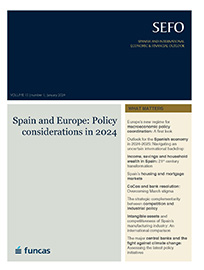Spain and Europe: Policy considerations in 2024
Fecha: enero 2024
SEFO, Spanish and International Economic & Financial Outlook, V. 13 N.º 1 (January 2024)
Index
In the last days of its rotating presidency, the Spanish government successfully led negotiations in the Council of the European Union to agreement on a new regime for macroeconomic policy coordination. Once agreed by the European Parliament, the new framework will significantly increase national ownership of fiscal consolidation, while at the same time easing the path of adjustment in comparison with the framework it replaces.
Compared to its European peers, the Spanish economy has weathered the inflationary storm and geopolitical tensions of recent years relatively well, buoyed by its strong competitive positioning. In the near-term, however, a slowdown is anticipated in light of the weak external environment and contractionary turn in macroeconomic policy, with fiscal dynamics remaining a key vulnerability.
Spanish households and their finances have undergone major structural transformation since the start of the century. These changes should be taken into consideration to ensure proper public policy design.
Despite an adverse economic climate, house price growth is proving resilient in Spain, fuelled by wholesale and non-resident demand, in addition to retail and residential demand, eroding affordability metrics. Focusing resources on enhancing access to affordable, quality housing, fostering an efficient rental market and increasing housing supply could help to curb this trend and facilitate more equitable access to housing.
Given the fact that they are considered loss absorbing instruments in the event of resolution, CoCos have emerged as a very important barometer for measuring confidence in the banking system. Although the bail-in of CoCos during the rescue of Credit Suisse created a stigma that prompted the global CoCo market to collapse, the market has recovered in recent months, marked by a significant rebound in prices and, above all, in issuance activity.
Despite broad-based agreement within economic circles regarding the drawbacks related to the application of industrial policies, recent global challenges have reopened the debate over their potential benefits. If public sector intervention is indeed necessary, it should be aligned to encourage competition and innovation.
The intensity of the Spanish manufacturing sector’s investment in intangible assets is practically half of the European average and this gap has widened since the financial crisis. For the Spanish manufacturing industry to gain competitiveness at the international level, it must commit strongly to digitalisation, which requires closing the gap in investment intensity in intangibles relative to its competitors.
While it is widely acknowledged that climate policy-making is the prime responsibility of governments, central banks are also taking steps to address climate change within their remits. That said, the extent to which central banks integrate climate risks into their work varies depending on each institution’s respective mandate and domestic political preferences vis-à-vis climate change.

